Understanding Tortoise Costs: A Complete Financial Guide
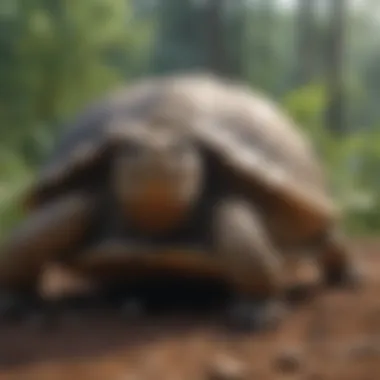

Intro
Owning a tortoise is more than just a delightful pet choice; it is a significant financial commitment. The expenses associated with tortoises go beyond their initial purchase price. Potential owners need to consider the costs of their daily care and maintenance. Understanding those costs is crucial for a satisfactory long-term relationship with your tortoise.
This guide will dive into various financial dimensions related to tortoise ownership. By addressing factors like purchasing costs, ongoing care expenses, and environmental requirements, this guide aims to provide a snapshot for potential owners. Anyone considering bringing a tortoise into their life should read on for crucial insights.
Care Tips
Taking care of a tortoise requires routine diligence and commitment. First and foremost, daily care routines form the backbone of successful ownership. Without providing adequate attention, the tortoise may not thrive. Owners must establish a pattern, checking on the turtle's living conditions, hydration, and food availability.
Daily Care Routines
Start the day by observing the tortoise. Check for any signs of distress, discomfort, or unusual behavior. A well-maintained shell and active movements are positive signs. Make sure to provide fresh food and clean water daily. Also, ensuring their habitat is appropriate is essential.
Cage Setup and Maintenance
The cage setup significantly impacts a tortoise's well-being. The size and environment of the habitat should match the breed's needs. It often includes soil for burrowing, space for movement, and suitable hiding spots. This setup involves initial costs, but regular maintenance plays a key role in long-term stability. Cleaning the habitat routinely can prevent diseases and promote a healthier life.
Hygiene and Cleaning Practices
Keeping a tortoise's living environment clean is non-negotiable. A clean habitat not only enhances comfort but also minimizes health risks. Spot cleaning can be enough on regular days, but thorough cleaning should occur every few weeks. Ensure that harmful residues or unappetizing smells do not hinder your tortoise's happiness. Cleaning tools should be safe and caused no harm to the pets.
Seasonal Care Adjustments
Tortoises are sensitive to changes in their environment. During seasonal shifts, small adjustments can become vital. If it’s getting too cold or hot, the habitat might need alterations. For example, increasing heating during colder months or providing shade in the blazing summer becomes necessary. Proper thermal control should be an asset for healthy growth and activity.
Financial Factors in Caring for Tortoises
The daily care routines must be supported by a solid budget plan. Active tortoises require not just one styles care but also versatility in nature. Therefore, developing a financial strategy would be paramount for sustainable pet ownership.
In considering ownership, everything sums up far more than procurements costs alone. You need to calculate variables whether estimating food prices, medical expenses, or the frequency of necessary maintenance equipment. Ultimately with thoughtful planning and preparedness, being a tortoise owner can highly rewarding,
"Forearmed is forewarned - the secret to successful ownership lies in meticulous planning."
Prologue to Tortoises as Pets
Tortoises, as living beings, bring unique dynamics into the realm of pet-keeping. Understanding their nature, needs, and considerations is paramount before making such a commitment. This section will delve into the historical significance as well as the variety of species available. Educating potential owners about these aspects sets a strong foundation for sensible choices about tortoise care and overall wellbeing.
Historical Significance and Popularity
The history of tortoises as companions dates back thousands of years. Many cultures have revered tortoises, often viewing them as symbols of longevity and earthiness. For example, ancient Greeks adored these creatures, finding purpose in their relatively long lifespans.`
As time passed, their popularity surged not just for their cultural significance but also as exceptional pets. People became drawn to their intriguing behavior and gentleness. Tortoises' tranquil disposition often resonates with those seeking companionship without the hyperactivity of traditional pets.
Today, they rank among the commonly kept reptiles. Many households cherish these creatures, attracting various enthusiasts who appreciate their beauty and slow-paced lifestyle. Recognizing their importance enriches the understanding of tortoises and builds preference towards potential ownership and views curtains on awareness narrows down to custom care.
Understanding Tortoise Species
Diversity among tortoise species is vast. Textbooks and guides categorize them based on characteristics, size, and specific habitat needs. Some common species include the African spurred tortoise, Russian tortoise, and the sulcata tortoise. Each of these has its specific requirements related to diet, habitat, and care routines.
- African Spurred Tortoise: Large in size, needing sizable space, and a diet high in fiber, consisting mainly of grass.
- Russian Tortoise: Often smaller, they adapt well to various environments, and require both dry areas for basking and moisture for humidity.
- Sulcata Tortoise: Known for their impressive size growth and need for significant outdoor space, they require dietary attention to prevent weight issues.
Potential future owners should spend quality time researching species, aligning them with capabilities in knowledge and readiness to care for such diverse needs. Understanding tortoise species intricacies ensures informed choices while promising a more productive relationship.
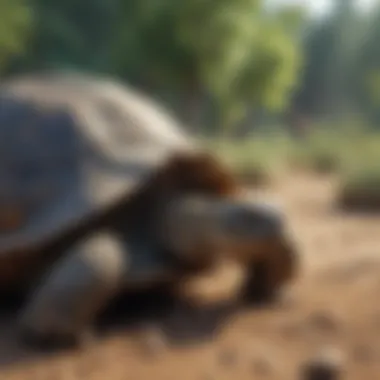
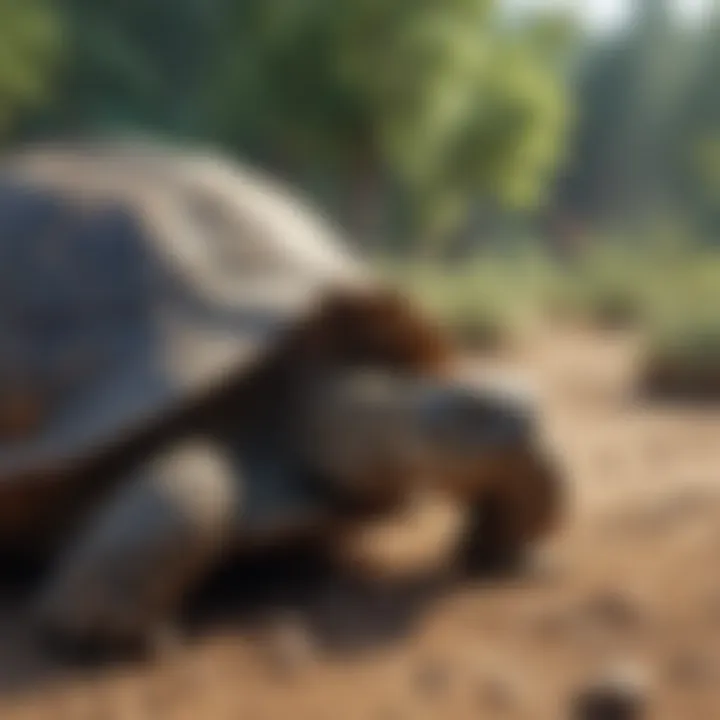
Initial Purchase Costs
The concept of initial purchase costs is vital for anyone considering tortoises as pets. Beyond merely acquiring a tortoise, understanding these costs can shape a potential owner’s financial planning. Knowing costs afferent to different species, the method of purchase, and legalese ensures that prospective owners can afford both the upfront and ongoing care required.
Cost by Species
Common Tortoise Species and Their Prices
Common tortoise species possess traits that make them more accessible to owners. The Eastern Box Turtle and Russian Tortoise are examples that commonly surface in discussions. These species typically range from $50 to $250, depending uppon the size and age. Their popularity can be ascribed to substantial ease of care and availability in many pet stores and breeders.
Advantages:
- Easier to find, as various breeders and pet stores often stock these breeds.
- Knowledgeable owners can provide enough round-the-clock care as they adapt to basic habitats suits.
Disadvantages:
- While they are lower cost upfront, subsequent costs in care, diet, and health maintenance need to be considered.
Rare Tortoise Species and Their Prices
In stark contrast, investing in rare tortoise species carries significant implications. Species like the Aldabra Tortoise or Leopard Tortoise can command prices ranging from $1,000 to $5,000. Unique features such as their size and distinctive coloration distinguishes them from zodiac and makes them both intriguing and sought-after.
Advantages:
- Rare tortoises can serve as an integral conversation pieces and remind fellow enthusiasts of distinct traits across species.
- Their rarity often adds a corresponding, potential increase in future financial value for collectors.
Disadvantages:
- These higher price points become burdensome via additional upkeep, including specific dietary compositions and habitats.
Purchasing from Breeders vs.
Pet Stores
When deciding its better to purchase from a breeder or a pet store, each avenue comes with its series of benefits and drawbacks. Breeders typically provide more accurate background on the tortoise's lineage, health, and behavior. Moreover, hatchlings from registered breeders might ensure strengths in genetic resilience against certain diseases.
Conversely, pet stores offer the convenience of immediate purchase but often lead to uncertainty regarding the animal’s health or history. Often, pet shops may not have trained staff able to answer expansive questions you might have before you settle on a specific acquisition.
Considerations for Legalities
Legal considerations are far too often overlooked before securing a tortoise. Local legislation can impose regulations on owning particular species, such as possession or breeding permits. Some species are protected, and getting caught with them can lead to hefty fines or worse.
Before making any financial commitment, it is prudent to research any relevant laws and guidelines pertaining to pet ownership. Creating awareness about these needs fulfills the first steps to becoming responsible and informed owners.
Remember, success in tortoise ownership begins with sound financial planning and informed, responsible decisions!
Ongoing Care Expenses
Ongoing care expenses for tortoises are recurring costs that every potential owner must comprehend thoroughly. These expenses exceed the initial purchase price and encompass various elements essential for the health and well-being of the tortoise. Understanding these costs ensures that future owners recognize the financial commitments involved and can provide a suitable environment and adequate care.
Housing and Habitat Set-Up
The habitat of a tortoise is a critical part of its care. A suitable enclosure includes proper size, temperature, and humidity levels. Invest in a spacious outdoor enclosure or a large indoor habitat if needed. The costs associated can vary significantly based on the type of setup chosen.
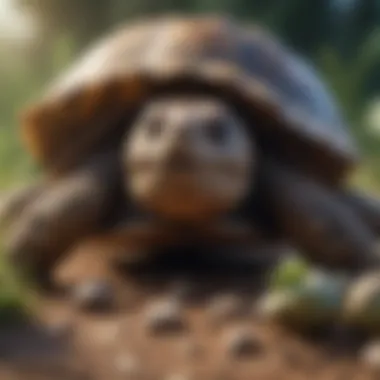

- Outdoor Enclosure: This might require fencing material, UV lights for basking, and heat sources which can range from $200 to $1,000.
- Indoor Habitat: This includes a terrarium, substrate, heat mats, and cooling options, often costing $100 to $800.
Regular maintenance costs, such as cleaning supplies, should also be considered. A clean habitat prevents health issues, making it an essential investment.
Dietary Needs and Nutritional Costs
Feeding tortoises appropriately is fundamental for their growth and overall health. Tortoises need a balanced diet consisting primarily of greens, vegetables, and some fruits. The cost of providing this diet varies based on location and availability of fresh produce.
On average, the monthly food expenses can amount to $30 to $100. Several tortoise owners opt for commercial pellets as supplements, which can add to the monthly expenses. Specific diets cater to various species; hence, consult experienced owners or veterinarians to understand the dietary needs precisely.
Routine Veterinary Care
Routine veterinary care is vital. It includes regular health check-ups and potential treatments when sick, which are imperative to the longevity of these pets. Without proper veterinary attention, most tortoises may suffer from preventable health issues.
Regular Health Check-ups
Regular health check-ups help identify potential illnesses before they develop into serious conditions. A vet familiar with reptiles provides a tailored approach to your tortoise's needs. Regular check-ups can cost anywhere from $50 to $200 per visit, depending on your location and clinics. Keeping an annual health routine is not just comfort; it is part of the proactive management that every tortoise owner should prioritize.
Vaccination and Treatment
Though tortoises don’t require vaccinations as commonly understood in canine or feline care, some preventative treatments might be necessary, depending on the species and location. Knowing the needs specific to certain tortoises can be enlightening. Treatment costs vary widely; however, those can begin from $100 and can reach up to unforeseen amounts in case of emergencies.
Miscellaneous Expenses
There are a variety of additional costs. These can enhance your tortoise's habitat and overall happiness.
Enrichment Materials
Enrichment materials like logs, rocks, and tunnels are essential for mental stimulation and physical exercise for tortoises. They encourage natural behaviors. Costs can vary depending on the complexity and materials, ranging roughly from $20 to $200 over time. Investing in these items enhances the quality of life for treadmill, lively tortoises who thrive in a dynamic environment.
Utilities Costs (Electricity, Water)
Caring for tortoises may unexpectedly spike utility costs. Heating lamps and basking lights are essential for maintaining proper climate within enclosed habitats. These devices require electricity, increasing bills substantially, perhaps adding $10 to $50 monthly. It’s ideal to factor these regular expenses into an overall financial plan for tortoise care.
In summary, Ongoing care expenses form a substantial component of the overall cost of caring for tortoises. Methodical planning in regard to housing, diet, routine healthcare, and miscellaneous necessities can lead to a fulfilling experience with your relative small reptile friend.
Factors Influencing Tortoise Costs
Understanding the factors that influence the costs of tortoises is essential for anyone considering them as pets. This section delves into elements like age, geographical location, and market dynamics, which significantly impact prices. Each factor offers its unique insights into the financial considerations of owning a tortoise.
Age and Size of the Tortoise
The age and size of a tortoise directly affect its market price. Younger tortoises are often less expensive because they have not yet reached full maturity. However, their lifespan can be a double-edged sword. Owners will need to invest in future care that may be more significant for larger tortoises as they grow.
Commonly, smaller tortoises may be purchased for a few hundred dollars, while larger, adult tortoises can potentially run into the thousands. Buyers looking for certain species, such as the Aldabra giant tortoise, may experience even more significant costs related to the size.
Certusly, older tortoises usually confer certain advantages. They are more adapted, easier to care for, and come with known health histories. Weighing these pros and cons helps in deciding the right paricular purchase.
Geographical Location and Availability
Geographical location plays an undeniable role in the cost of tortoises. Some regions have a higher demand for tortoises, which can drive prices up. For example, urban areas might see higher prices due to restricted availability of specific breeds as compared to rural wholesaling areas.
Additionally, certain tortoise species are more widely kept and bred in particular locations. Accessibility influences supply, impacting market prices. In places where tortoises are frequently bred, prospective pet owners might find better prices. On the contrary, scarcity can maximize operational overhead, likely increasing the price.
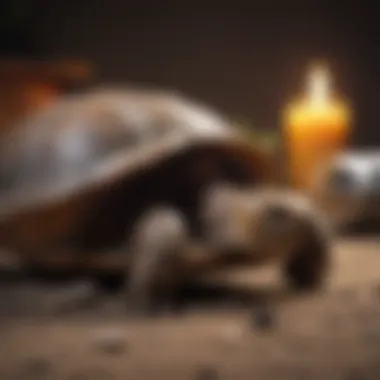

Operating in compliance with local laws also is important. Check availability with certified breeders or authorized pet stores to avoid potential legalities that might arise if proper procedures are not followed.
Market Trends and Popularity
Just like any other pet, tortoise costs are subject to market trends and changes in popularity. When a specific species gains popularity due to trending influencers, their prices invariably rise with demand. A sudden interest in, say, the Russian tortoise can inflate market prices very quickly.
Investigating the market trends gives you an understanding of when to buy or if timing investments is crucial.
Understanding the internal market dynamics will refine your purchasing strategy.
To sum up, influencers have the power to tilt the scale. These trends can elicit price spikes or unexpectedly favorable prices due to lessened demand. Being observant and knowledgeable in this realm can aid in making informed purchase decisions that suit various financial plans.
Budgeting for a Tortoise
Budgeting is essential when considering a tortoise as a pet. Owning a tortoise is not just a fleeting expense—it requires careful financial planning. Understanding the costs can help you avoid unexpected financial burdens later. Apart from the initial purchase price, potential owners must remarkable consider ongoing care and emergency expenses that may arise from keeping a living creature.
Having a budget helps you establish a clear outlines of costs associated with owning a tortoise. This may include regular veterinary check-ups, dietary needs, housing, and setup costs. Creating a financial framework introduces clarity and helps prioritize spending as necessary.
A budget also serves as a guiding compass, creating financial space for long-term commitments. Knowing the overall financial implication can suggest a reasonable approach, ensuring that potential tortoise owners do not find themselves exceeding their means in supporting their future pet’s well-being.
Creating a Financial Plan
Developing a financial plan for a tortoise involves several vital steps. First, create a comprehensive list of all start-up costs. Consider purchasing the tortoise, setting up habitat, acquiring all necessary equipment like UVB lamps, and insurance costs if you decide to obtain it. Also, don’t forget the supplementary monthly expenses. These can inclusde food, utilities needed for habitat, and vet visits.
It’s wise to categorize the expenses into distinct groups, for example:
- One-time purchase costs: Price of the tortoise, enclosure setup, tools
- Ongoing monthly expenses: Food, utilities, maintenance
- Yearly expenses: Veterinary fees, enrichment items
A realistic estimation of costs can highlight serious obligations. If you estimate $50 per month for balanced nutrition and $30 for climate controls as minimums, be sure these fit in your budget.
Long-term Financial Commitment
Owning a tortoise is a long-term commitment which can often span several decades, depending on the species. Thus, it’s imperative to not just glance at immediate costs but also to consider future obligations. Plan for lifestyle changes and anticipate that circumstances may arise sooner than you expect.
Planning ahead involves thinking about:
- Long-life span: Tortoises can live 50 years or more, especially giant species.
- Potential emergencies: They may need special tubes or alternative habitats if they are sickolino.
- Adaptable routine: Financial capacity may shift over time due to personal, social, or economic conditions.
It's crucial o remember that preparing a journey and respecting000 these unique creatures requires using a realistic and structured financial perspective. Making decisions on manageable terms ensures a more informed future exhaustive regarding your pet searching game.
A clear financial understanding creates space for truly meaningful pet ownership that not only allows development but assures lifetime well-being.
Ending
In this section, we examine the importance of understanding the financial aspects involved in owning a tortoise. Owning such a pet demands a significant financial commitment that deserves careful consideration before taking the plunge.
Weighing the Financial Burden
The first critical element in evaluating tortoise ownership is understanding the entirety of the cost involved, from initial purchase to ongoing care. Tortoises can have varied initial costs, often influenced by their species, breeder reputation, and geographical location. Beyond these fees, ongoing expenses—ranging from habitat maintenance to dietary needs—can quickly accumulate. When calculating your potential expenses, consider adopting a financial plan that encompasses not only regular check-ups and vaccinations but also special dietary needs and enrichment items that enrich your tortoise's quality of life.
It's essential to differentiate between necessary costs and optional enhancements that might arise throughout ownership. This means preparing for emergencies, understanding seasonal cost variations, and anticipating lifespan expenses. Tortoises can live for decades, which makes long-term financial considerations crucial.
Making Informed Choices
Informed decision-making plays a vital role in responsible tortoise ownership. Finding information from diverse resources is important. Familiarize yourself with species, environments, and community experiences through platforms like Reddit or visits to dedicated forums. Before proceeding to purchase, you need to weigh all aspects critically. Not conducting proper research could lead to impulsive buying—often resulting in shortfalls in care and unexpected financial strains.
Key considerations also involve selecting reputable breeders or pet stores, understanding the health and legal requirements of your region, and formulating a comprehensive care strategy. Seek out relevant literature on tortoise care and connect with existing communities. With a pool of information, potential caretakers can sculpt a detailed financial plan well-tailored to their situation.
"Buying a tortoise is not just a one-time expense; it can mean decades of commitment." Keep this in mind to avoid future stress.















